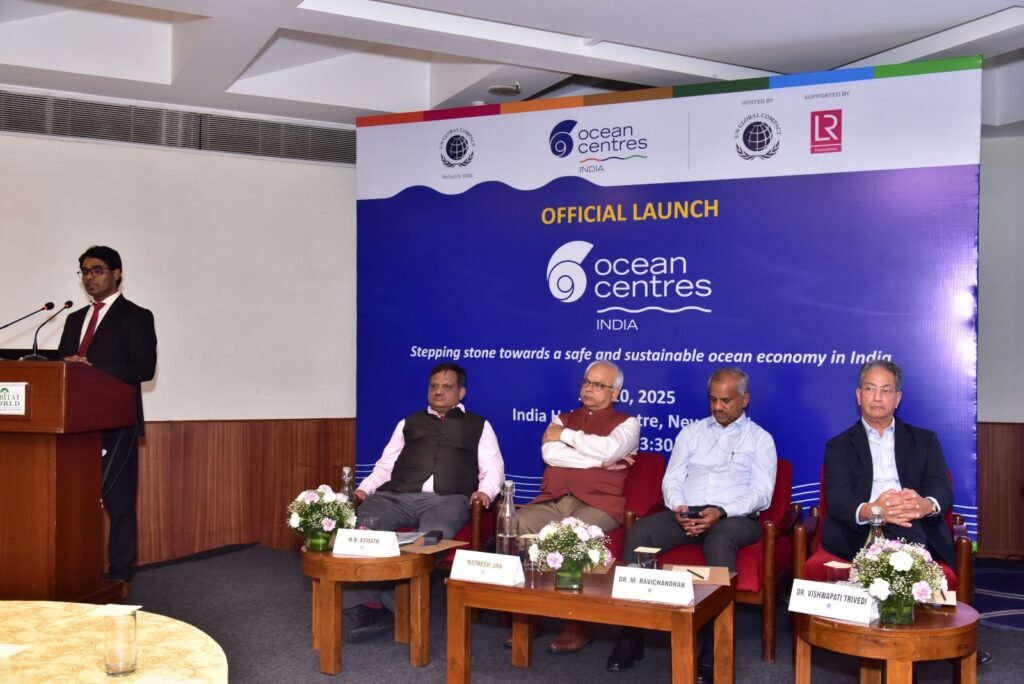Ocean Centres India serves as a multi-stakeholder collaboration platform to accelerate a safe and sustainable ocean economy. It helps influence policy, share innovations, address sub-sector challenges, and contribute to India’s national development goals.
NEW DELHI (India CSR): The global Ocean Centres initiative, which was introduced at the 2025 UN Ocean Conference in Nice, France, is being implemented in seven strategically important countries: India, Brazil, Ghana, Kenya, Bangladesh, Indonesia, and the Philippines. These centres are designed to serve as hubs for multi-stakeholder collaboration to address maritime challenges and promote safety and sustainability across four priority sectors: Shipping and Ports, Fishing and Aquaculture, Offshore Renewables, and Finance and Investment.
India on July 10, 2025 marked a significant step in bolstering maritime sustainability and safety with the official launch of Ocean Centre India, as part of the global Ocean Centres initiative, during a high-level event held at India Habitat Centre, New Delhi. The event was convened by the UN Global Compact Network India (UN GCNI) with active support from the Lloyd’s Register Foundation.
***
India’s Vision for a Sustainable Blue Economy
The Ocean Centres India launch was inaugurated by Dr. M. Ravichandran, Secretary, Ministry of Earth Sciences, Government of India, who emphasized the need to approach ocean sustainability through a five-pronged lens: Food, Water, Energy, Health, and Security. He noted, “India’s ocean economy is integral to national prosperity. Through this initiative, we can make significant progress towards achieving the goal of a Vikshit Bharat by 2047.”
The event also witnessed participation from eminent figures such as Dr. Vishwapati Trivedi, Former Secretary, Ministry of Ports, Shipping and Waterways; and Shri H.N. Aswath, Development Adviser to the same ministry, among other dignitaries.
***
Collaboration at the Heart of Ocean Centres
Speaking at the event, Ratnesh Jha, Executive Director, UN Global Compact Network India, stated:
“The Ocean Centres initiative provides a unique opportunity to anchor sustainability in India’s maritime industries. By aligning stakeholders around safety, innovation, and responsible business practices, we are laying the foundation for a resilient ocean economy.”
Dagmara Karbowska, Global Programme Manager at Lloyd’s Register Foundation, stressed the importance of identifying and mitigating maritime risks, stating that “safety is not just a compliance requirement—it’s the backbone of a thriving and sustainable maritime economy.”
***

10 Frequently Asked Questions (FAQs)
1. What is the Ocean Centres initiative?
Ocean Centres is a global initiative launched by the UN Global Compact, supported by Lloyd’s Register Foundation, to promote safety and sustainability in ocean-based economies. It aims to foster local solutions to maritime challenges through multi-sector collaboration.
2. Why has Ocean Centre India been launched?
Ocean Centre India is part of the global rollout designed to address India’s specific maritime sustainability and safety issues. It seeks to unite government bodies, industry leaders, financial institutions, and civil society to transition towards a safer ocean economy.
3. What are the four key focus areas of the Ocean Centres?
- Shipping & Ports
- Fishing & Aquaculture
- Offshore Renewables
- Finance & Investment
Each area is selected based on relevance to the Indian context and their contribution to both local livelihoods and global supply chains.
4. How does the Ocean Centres initiative contribute to national development goals?
Ocean Centres India is aligned with India’s Vision 2047 – Vikshit Bharat, supporting blue economy strategies, enhancing maritime resilience, and contributing to multiple UN Sustainable Development Goals (SDGs).
5. Who are the key collaborators involved in Ocean Centres India?
Partners include:
- Ministry of Earth Sciences
- Ministry of Ports, Shipping & Waterways
- UN Global Compact Network India
- Lloyd’s Register Foundation
- Various NGOs, research institutions, corporates like Tata Trusts, HCL Foundation, and multilateral bodies like ILO, UNDP, World Bank.
6. How will safety be integrated into maritime operations through this initiative?
Safety will be embedded across sectors through risk assessments, standard setting, capacity building, policy advocacy, and sharing of best practices. Stakeholders will be equipped with tools and frameworks to build resilient systems.
7. How can organizations participate in Ocean Centres India?
Organizations can become members by registering through the official website: 👉 https://www.oceancentres.com/india
Membership provides access to collaboration forums, best practices, policy dialogues, and project opportunities.
8. What role does the private sector play in this initiative?
The private sector is seen as a key driver of change. Through the initiative, businesses can align ESG goals, invest in sustainable technologies, and co-develop standards that enhance both profitability and environmental stewardship.
9. Is the initiative only focused on large corporations?
No. The initiative actively engages small and medium enterprises (SMEs), community-led organizations, and regional players, acknowledging that inclusive participation is essential for systemic impact.
10. What is the long-term goal of Ocean Centre India?
The ultimate goal is to transform India’s maritime sector into a model of sustainable development and safety by 2047, through systemic policy influence, collaborative innovation, and capacity building across sectors.
(India CSR)







